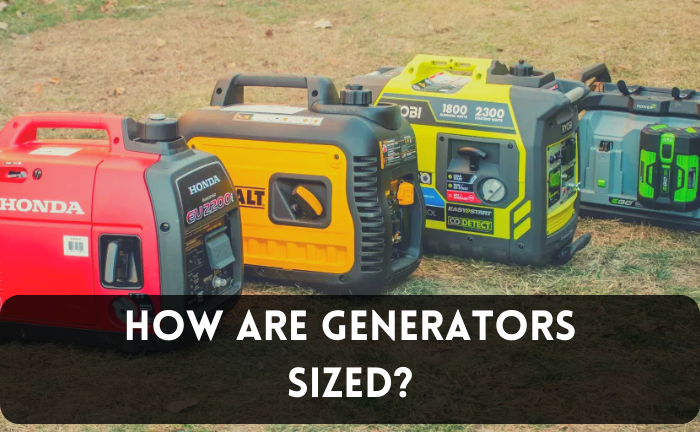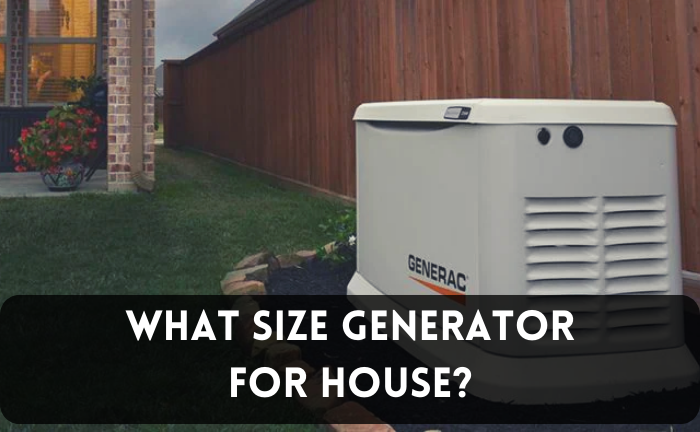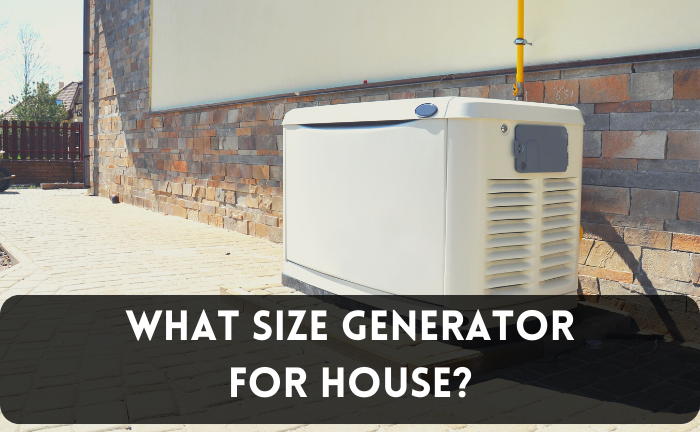
The biggest misconception which leads to the irritating future electrical issues in your home includes getting generators without proper knowledge. Not only you, many more wise people always promote getting information about generators before getting for their house.
For your better navigation, if you are looking for what size generator for a house is best, then it would be the generator rated at 5,000 watts or 7,500 watts. It would be enough for running all the critical home equipment at once. The critical household equipment includes a freezer, refrigerator, lights, well pump, and all gadgets.
Related: Are Whole House Generators Worth It?
Table of Contents
What Size Generator For House?

Think of yourself as you are getting a generator to run home appliances, not a house. So, firstly you need to make a list of what appliances or gadgets you are going to connect with the generator. Then, you need to make proper calculations of wattage and energy consumption.
After doing all this, you will be eligible to conclude how big of a generator you need to get. To facilitate you with proper navigation, we are going to describe some factors or capabilities that your generator should have.
Check Out Generators For House – 5000 Watt Generators
Check Out Generators For House – 7000 Watt Generators
For House, Generator should be of Enough Power
Firstly, your generator should have enough power (wattage power) to run your home appliances. Well, it depends upon you how many appliances you are going to run with the generator. For example, if you are going to run a freezer, machines, and lighting, then your generator should have enough power to run these three gadgets.
Pay attention – you can get a generator with as much power as you want, but the thing is, you first need to calculate how much power you want to run your appliances.
Can Easily Bear High Voltage Burden
And yes, that’s another important feature a generator should have. The generator should have enough power to bear the high voltage burden. But for this, you need to make calculations and conclude how much voltage energy is needed to run your appliances.
And here’s how you need to make calculations.
Calculations For Ideal Generator Size
It’s always the first wise step towards getting a generator for your house. And yes, you need to perform this step very carefully because it decides whether you will avoid future electrical issues or not.
In this step, you need to care for two things to ensure calculations. Firstly, the running devices and then the power requirement. Once you have decided the devices you are going to run and calculated their power requirement, then it will be clear how much wattage generator you need. Let’s get into the steps.
Running Devices
So, you need a generator for the whole house which means you need to add all of the critical household equipment to the list of running devices. Though it’s up to you how many devices you add to the list generally, the below ones are counted.
- Refrigerator
- AC
- Lighting Circuits
- Machine
- Clothes dryer
Now, you are done with the list. It’s time to make power calculations of all these gadgets and conclude what size generator for the house is enough.
Power Requirement Calculator
So, here is the step you need to check to start (initial watts) and run (after initial) watts of every appliance you will add to the list of running devices connected to the generator.
You can make a table as described below:
|
Appliances |
Wattage (starting/running) |
|---|---|
|
Washing machine |
1200/1200 |
|
Clothes dryer |
6570/5400 |
|
Freezer |
2900/700 |
|
Central AC (2-ton) |
8750/3800 |
|
Laptop |
250/250 |
|
Lightning |
1100/1100 |
|
Total Wattage |
20770/12450 |
If you are running the same devices mentioned in the above table, you need a 21KW whole home generator. But if you have more devices to add to the table, you need to do all the steps similarly. First, you need to calculate the initial wattage and then run.
After doing this, you need to add the total wattage, and you will get to know what generator you should get.
Choosing House Generator According To Needs
Sometimes, people get generators without proper calculations, as described above, which will get them involved in irritating situations. To avoid all this, you need to make calculations first and choose a generator according to your needs.
Getting generators that don’t even have enough capacity to bear the voltage burden will cause an electrical spark in the wiring. And yes, the chances are that they will need to repair the generator.
Why Should We Always Choose Generators Slightly Bigger Than Our Needs?
Upon deep analysis, it has been observed that electrical engineers always recommend getting a generator that exhibits some extra wattage power. There Are some core reasons behind this statement present that you may not be aware of.
Here’s why.
- If your generator has extra wattage power, you can enjoy its longer lifespan.
- Extra watts will help your generator to bear voltage load without any damage.
- Fully loaded generators always make noise. But if a generator has extra wattage, it will avoid any kind of noise.
So, always get a generator that has some extra watts available.
Check out how generators are sized to stop searching for what size generator for the house.
How are Generators Sized?
In simple, generators are sized according to their electrical output, or you can say that in Watts and kilowatts. For your knowledge, 1kW = 1000W. Before getting a generator, you need to ensure its size and whether you are looking for it.
Do not get too small or even large a generator. Because smaller ones can be heated and automatically turned off. In contrast, the larger one is the cost of operation.
Apart from all this, you need to adopt safety rules no matter what sized generator you have purchased. It’s necessary to take care of all the safety measurements to avoid damage because generator damage is always a severe one.
For your better navigation about using a generator, we have mentioned some core safety rules below.
Generator Safety Tips For Home
The electrical engineers and experts instruct all safety rules that you need to pay attention to.
Place Generator 20 Feet Away from Home
It has been observed that generators emit heat radiations that cause skin burn or severe damage. Also, an increase in temperature is not in your favor from all aspects. And also, if you put a generator 20 feet away from home, you can avoid noise near you. Plus, the engine exhaust is away from windows and doors.
Related: How Far From The House Should a Generator Be Placed?
Should be Placed in a Moderate Environment
A generator is a gadget or device heated the same as other devices. If you don’t provide optimum heat, it causes proper loss of functioning and starts overheating. It will also lead to more combustion and heat.
According to the research, if you place a generator in a heated area, the heat will allow a few oxygen molecules to burn in the turbine or engine. That is what directly impacts potential power. In contrast, lower temperature also reduces the proper functioning of a generator.
So, you need to put the generator in a place that is exhibiting moderate temperature.
Turn Off Before Refueling
Some people don’t care for this safety measure, especially which can be most dangerous to you. Do you know that it can even lead to an explosion? Yes, it can. The gasoline spilled into a hot engine can ignite and then create a fire which will further lead to the explosion.
Also, don’t put fuel into a heated generator. In fact, turn off the motor and let the engine cool down completely, which will take a minimum of 15 – 20 minutes.
Don’t Run a Portable Generator in the Rain
Portable generators are not waterproof and can damage if run in the rain. As they are always heated, rain damages their heating system, and water going inside the motor can even lead to an explosion.
To avoid this, you need to use covers which can be a tent, canopy, or even homemade. The verdict is to prevent the device from any kind of moisture.
Related: Where to Put Generators During A Storm? Safety First
Never Add Fuel to the Hot Unit to Avoid Explosion
Hot units allow sparking, and that’s because an explosion can be caused if fuel is added. That type of explosion is called a gasoline explosion in the scientific language. To avoid this, we will ask you to turn the generator and wait for cooling down. It depends upon the generator’s wattage and how much time it will take to cool down.
Generally, you need to wait for 15 – 20 minutes to cool down your generator. Once your generator cools down, you can add fuel to it.
Power Cords Placement
Most of the accidents have been observed because of the improper placement of generator power cords. The plugs and sockets will jerk out if one accidentally trips over cords. This will damage the entire outlet. So, you are highly recommended to place the cords carefully and cover all the wires using covers.
You can also put warning signs where you have set the power cords to avoid family members.
Cover Your Generator
Nothing damages the generator more than moisture. According to the experts, a moisturized generator can cause electric shock and short circuits. Besides, water seepage can also damage the whole generator and even the connected appliances.
So, you are greatly recommended to cover your generator to avoid any kind of damage. And yes, avoid running a generator in the rain, as we have mentioned above.
Do Not Overload Generator
To avoid overheated outlets, you need to avoid overloading your generator. Meanwhile, you know your generator’s voltage-bearing capacity, so you need to connect possible devices with it. Connecting more devices can lead to overheating, which is a cause of short circuits and a damaged diode.
And you know what, overheating can also lead to fire, especially when you have a diesel or LPG generator.
Never Make Direct Connections
Do not directly connect generators to your primary connection because it leads to short circuits. Always use a transfer switch between the generator and main connections. It has been recommended because suppose the generator overheats and turns off; then your main connections will be saved.
In contrast, suppose your generator was connected to the main connections. Your whole home wiring will be damaged, and you need to repair all the things again. Chances are there that connected appliances are damaged.
Types of House Generators
We are getting you aware of the types of generators to get the best for your house according to you. No matter which type of generator you will get, the procedure is the same as we mentioned above.
Till now, there are three types of generators recognized by the people.
Standby

This is the most common type of generator which is used in homes. It’s often called a ‘home standby Generator,” and that’s the reason behind its popularity it runs the whole house when utility power goes out.
Standby generators have the capability to bear even high voltage.
Prime
Talking about the prime generator, it offers a variable power load and is designed to work long-term, serving as the primary source of power for operation. This generator is often called a “backup power provider.”
Portable
Portable generators are those providing short-term electricity, and you can use them in emergencies. For example, they are mostly used when utility connections are interrupted and no wire connection remains.
Nowadays, people are using them in homes and getting benefits from their nature. You can also get them for your home if you find them suitable.
All these three types of generators have their characteristics, features, and ranges. Depending on their circuits, it can be calculated how much electricity they will produce. For more about Audio gadgets check out audiotechgadget.com.
The Bottom Line
The above article has shared with you what generator size is ideal for your home. In essence, a lot of essential knowledge is also shared with you.
In fact, you can calculate home appliances’ energy requirements and then calculate how much power (watts) you will need after reading the article.

